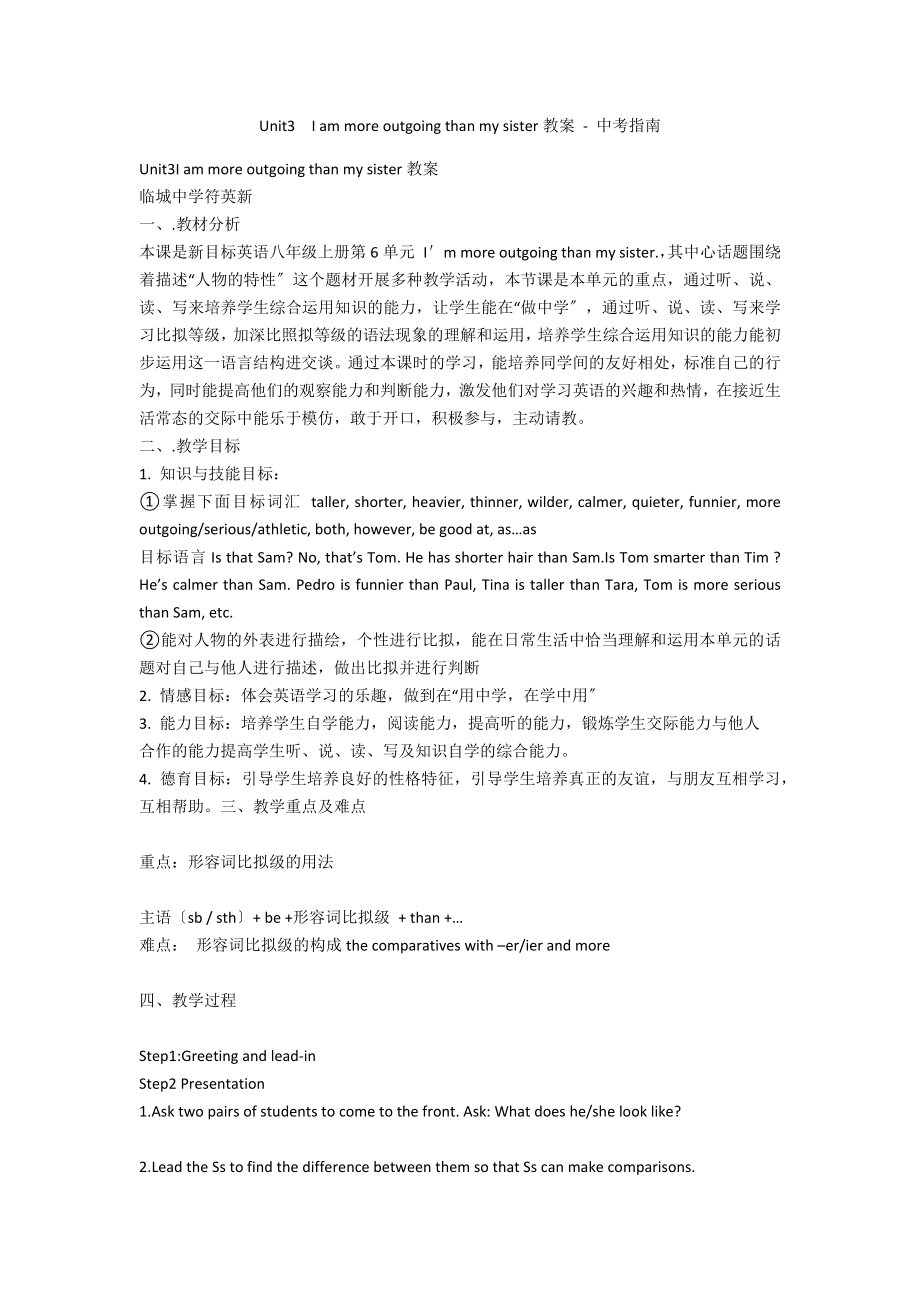《Unit3I am more outgoing than my sister教案 - 中考指南》由會(huì)員分享���,可在線閱讀�����,更多相關(guān)《Unit3I am more outgoing than my sister教案 - 中考指南(3頁(yè)珍藏版)》請(qǐng)?jiān)谘b配圖網(wǎng)上搜索�����。
1�、Unit3 I am more outgoing than my sister教案 - 中考指南
Unit3I am more outgoing than my sister教案
臨城中學(xué)符英新
一、.教材分析
本課是新目標(biāo)英語(yǔ)八年級(jí)上冊(cè)第6單元 I'm more outgoing than my sister.�����,其中心話題圍繞著描述“人物的特性〞這個(gè)題材開(kāi)展多種教學(xué)活動(dòng)�,本節(jié)課是本單元的重點(diǎn),通過(guò)聽(tīng)���、說(shuō)����、讀�、寫來(lái)培養(yǎng)學(xué)生綜合運(yùn)用知識(shí)的能力,讓學(xué)生能在“做中學(xué)〞���,通過(guò)聽(tīng)��、說(shuō)、讀��、寫來(lái)學(xué)習(xí)比擬等級(jí)�����,加深比照擬等級(jí)的語(yǔ)法現(xiàn)象的理解和運(yùn)用,培養(yǎng)學(xué)生綜合運(yùn)用知識(shí)的能力能初步運(yùn)用這一語(yǔ)
2�����、言結(jié)構(gòu)進(jìn)交談����。通過(guò)本課時(shí)的學(xué)習(xí),能培養(yǎng)同學(xué)間的友好相處�����,標(biāo)準(zhǔn)自己的行為�����,同時(shí)能提高他們的觀察能力和判斷能力����,激發(fā)他們對(duì)學(xué)習(xí)英語(yǔ)的興趣和熱情,在接近生活常態(tài)的交際中能樂(lè)于模仿���,敢于開(kāi)口�,積極參與�,主動(dòng)請(qǐng)教�。
二�����、.教學(xué)目標(biāo)
1. 知識(shí)與技能目標(biāo):
①掌握下面目標(biāo)詞匯 taller, shorter, heavier, thinner, wilder, calmer, quieter, funnier, more outgoing/serious/athletic, both, however, be good at, as…as
目標(biāo)語(yǔ)言Is that Sam? No, that’s T
3��、om. He has shorter hair than Sam.Is Tom smarter than Tim ? He’s calmer than Sam. Pedro is funnier than Paul, Tina is taller than Tara, Tom is more serious than Sam, etc.
②能對(duì)人物的外表進(jìn)行描繪����,個(gè)性進(jìn)行比擬,能在日常生活中恰當(dāng)理解和運(yùn)用本單元的話題對(duì)自己與他人進(jìn)行描述�,做出比擬并進(jìn)行判斷
2. 情感目標(biāo):體會(huì)英語(yǔ)學(xué)習(xí)的樂(lè)趣,做到在“用中學(xué)����,在學(xué)中用〞
3. 能力目標(biāo):培養(yǎng)學(xué)生自學(xué)能力,閱讀能力�,提高聽(tīng)的能力,鍛煉學(xué)生交
4�����、際能力與他人
合作的能力提高學(xué)生聽(tīng)��、說(shuō)�、讀、寫及知識(shí)自學(xué)的綜合能力���。
4. 德育目標(biāo):引導(dǎo)學(xué)生培養(yǎng)良好的性格特征�����,引導(dǎo)學(xué)生培養(yǎng)真正的友誼����,與朋友互相學(xué)習(xí)���,互相幫助�。三�、教學(xué)重點(diǎn)及難點(diǎn)
重點(diǎn):形容詞比擬級(jí)的用法
主語(yǔ)〔sb / sth〕+ be +形容詞比擬級(jí) + than +…
難點(diǎn): 形容詞比擬級(jí)的構(gòu)成the comparatives with –er/ier and more
四、教學(xué)過(guò)程
Step1:Greeting and lead-in
Step2 Presentation
1.Ask two pairs of students to come to
5��、 the front. Ask: What does he/she look like?
2.Lead the Ss to find the difference between them so that Ss can make comparisons.
3.Sum up the comparatives with –er/ier and more
Step3 Practice
1a,match each word with its opposite.
1b,listen and number the pairs of twins in the picture(1-3
6�、)
1c,practice the conversation in the picture above.Then makeconversation about the other twins.
Step4 Listening
T: You know your desk mates very well. Be friends with them. I know you have many friends. Do you have friends who are twins? Next we are going to learn something about the twins
7、 Tina and Tara. Are the words used with –er/-ier or more? Listen carefully.
Ss: Listen to 2a and 2b carefully and write in the box.
Step5 PresentationT: How interesting the twins are! This time let me introduce more interesting twins.(Show PPT) They are my daughters Andy and Anna. They are als
8��、o twins.
As we can see, in some ways they look the same. They have some things in common. They are both good at singing. They both enjoy dancing. They like more than one kind of sports. They are both athletic. They both like science. Their mother is a chemistry teacher, and their mother is good a
9����、t physics, too.
Ss: Ask the Ss to guess the meaning of the new words and expressions.
Step6 Reading
1.Listen and fill in some things in common
2.Read 2c by yourselves, then fill in some things that are different.
3.Read it again. Stand up and read it as quickly and loudly as you can.
10�����、
Step7 Exercises
單項(xiàng)選擇
()1.Sam likes sports and is_____ than his sister.
A. athleticB. athleticerC. more athletic
()2.-Who is_______, Tom or Mike?
A. thinerB. more thinC thinner
()3. The watch is as______ as that one.
A. cheaperB. cheapC. more cheap
()4. These boys are good at ____basketball.
A. playingB. to playC. play
Step8 summary
Step9 homework
Write a short passage about the things are the same or different between you and your family.
 Unit3I am more outgoing than my sister教案 - 中考指南
Unit3I am more outgoing than my sister教案 - 中考指南

